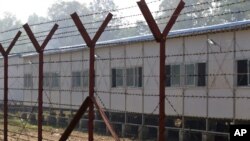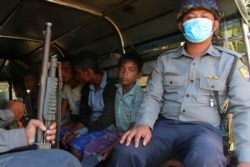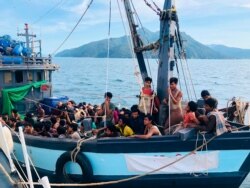Myanmar should end the "apartheid regime" that has left thousands of Muslim ethnic Rohingya families trapped in stifling displacement camps eight years after deadly communal clashes tore through the Buddhist-majority country's far west, the U.S. advocacy group Human Rights Watch said in a report released Thursday.
International attention on the Rohingya has focused mostly on the sprawling refugee camps in neighboring Bangladesh since a 2017 crackdown by Myanmar's police and military in Rakhine state sent 700,000 of them fleeing across the border. The United Nations called the widely alleged campaign of arson, rape and murder "a textbook example of ethnic cleansing." Rights groups have called it genocide. The government denies the claims.
Largely ignored are more than 130,000 Rohingya who have been confined to fenced-off and guarded camps in Rakhine state itself since 2012, according to U.N. figures, when a wave of communal violence between local Muslims and Buddhists drove them from their homes. About half the camps' denizens are children.
Human Rights Watch says conditions in those camps are getting worse and that the government's recent efforts to "close" them risk cementing the Rohingya's status as a segregated underclass. The group interviewed more than 30 Rohingya who live in the camps or fled them and nearly as many aid workers and advocates for its report, An Open Prison Without End: Myanmar's Mass Detention of Rohingya in Rakhine State.
Myanmar's government rejects the Rohingya's claim to a distinct ethnic identity — dismissing them instead as illegal migrants from Bangladesh — despite their roots in Rakhine going back generations, and it denies them citizenship unless they give up the claim.
"It has within that setup these camps that are effectively sites of detention," Human Rights Watch researcher Shayna Bauchner, who wrote the report, told VOA.
"It is a complete violation of all of their basic rights," she said. "They have been for eight years now been denied the ability to return to their homes, which is really all that they've been asking to do — to be able to return to their homes, to reintegrate into the community. They are instead being denied the ability to live lives with dignity, to achieve self-reliance."
Human Rights Watch says strict travel restrictions outside the camps — enforced with arrests and physical abuse — prevent many from finding work or going to school, leaving them largely dependent on deliveries from international aid agencies that increasingly are being blocked by authorities on vague and dubious grounds of health and security.
The report describes squalid and overcrowded communities with ramshackle shelters and open sewers, and cites other reports and studies that link those conditions to camp death and disease rates higher than those in surrounding villages.
The organization also warns that the government's nascent moves to "close" the camps since 2017 look less likely to relieve those conditions than perpetuate them.
The government claims to have closed three of the estimated 24 camps so far.
Human Rights Watch says a group of Buddhist ethnic Rakhine displaced by the 2012 pogroms was resettled to a site agreed on with the government, while a group of Muslim ethnic Kaman was coerced into moving hundreds of kilometers away to Yangon, Myanmar's commercial hub.
However, when authorities "closed" a Rohingya camp, Human Rights Watch says, they merely built new housing on the same site, leaving the same travel restrictions in place.
"The government is undertaking this process, which it is calling a process to close the camps, but is in reality just sort of entrenching the Rohingya's status as permanent detainees," Bauchner said.
"Their ability to work, to study, to get medical care are all severely constrained, and the result is a community that for generations will be cut off from self-reliance, from dignity, from ... being able to have opportunities to study in certain fields so that they can actually provide services on their own."
John Quinley, a human rights specialist for the advocacy group Fortify Rights who has been in regular contact with Rohingya in and out of the camps, agreed with Human Rights Watch’s dire assessment.
"These are internment camps in central Rakhine state trapping thousands upon thousands of Rohingya women, children and men. It's a systematic campaign to confine these people to these camps, so ‘apartheid’ is, yes, the correct way to describe it," he said.
He also expressed concern that the way the government claims to be closing the camps, whether on the same sites or new ones equally constrained, will do little if anything to relieve the Rohingya’s plight.
"Unless they're granted access to go back to their original homeland or places where they want to settle, it's pretty certain that the conditions will still be ones of internment," Quinley said.
He and Bauchner said the conditions in the camps, and the growing belief among the Rohingya trapped there that they will never improve, is adding to their despair. A few thousand have managed to flee the camps, often risking death to reach Malaysia by boat in hopes of a better life. Some don't make it.
“We know we will die in the sea," one Rohingya woman in the camps told Human Rights Watch. "If we reach there, we will be lucky; if we die, it is OK because we have no future here.”
Win Myat Aye, Myanmar's minister of social welfare, relief and resettlement, would not speak with VOA about the camps and referred questions to the ministry's permanent secretary, Ko Ko Naing, who could not be reached. Other government officials and spokesmen did not reply to VOA's requests for comment.











